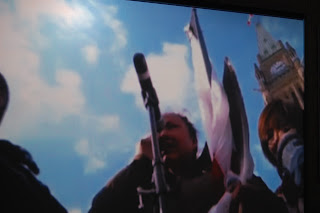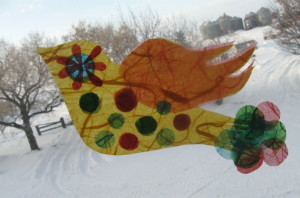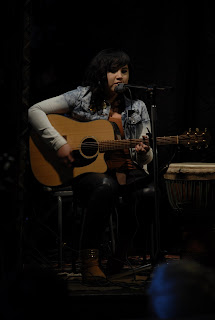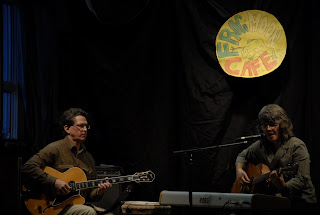Sandy stands at the microphone in the Governance Centre's inner circle. She has just made a short speech, thanking everyone for their contributions to this year's magazine, Kitoskayiminawak Pikiskwewak Our Young People Speak: The Healing Edition. She downplays her role, but as Lesley Farley and Michelle Hugli Brass have just said, "Sandy is a visionary." In fact, she is the one who has brought us all together.
Sandy has just mentioned a couple more thank you's and then, her voice fails. Sandy pauses. "We are getting our stories back," she says.
A few months ago, I asked Sandy if I could publish excerpts from her thesis on my blog. She graciously said yes.
Sandy is a story keeper. Here is the beginning.
"ECHOES OF VOICES FROM A LONG TIME AGO":
A SELF-REFLEXIVE JOURNEY OF UNDERSTANDING LEADERSHIP
FROM A PERSONAL AND INDIGENOUS PERSPECTIVE
A Thesis
Submitted to the Faculty of Graduate Studies and Research
In Partial Fulfillment of the Requirements
For the Degree of Master of Education
Educational Administration
University of Regina
Sandra L. Pinay-Schindler
July 2011
Copyright 2011: S.L. Pinay-Schindler
The personal journeys of First Nations Elders and leaders provide insight into
Acknowledgements
Thanking my helpers, both physical and spiritual, at both the beginning and at
the end of my thesis respects the Western and the Indigenous ceremonial protocols. I
wish to thank my co-supervisors, Dr. Linda Goulet and Dr. Larry Steeves, for their
patience, dedication, and time. They were incredibly supportive. Their viewpoints
and feedback on both Indigenous and Western methodologies and worldviews were
valued. My sincere thanks to Dr. Marc Spooner for expanding my synapses in his
introductory research class. He inspired me to explore the creative possibilities of thesis
work. It has been worth the long and winding road.
My thanks to the following organizations for funding and scholarships:
Prairie Valley School Division and the Faculty of Graduate Studies and Research for the
Aboriginal Graduate Student Scholarship, the LEADS Award in Educational
Administration, and the U of R Alumni Association Dr. John Archer Scholarship.
To my respected participants, Adlard, Flora, Julia, Grant, and Matthew, I thank
them for their honesty, trust, and generosity. They exemplify all that is grand and
powerful about First Nations leadership and I am humbled and honoured to know them. I
strive to reach the places of truth that they have attained. They are inspiring leaders.
Dedication
To my first role models: my parents, my sisters, and my brothers.
To my husband Kurt and our precious gifts, Ben and Brendan.
My parents: Emma (Crowe) & Noel Pinay Jr., Mary Immaculate Roman Catholic Church, Peepeekisis First Nation, June 17, 1946
Their hard work, sacrifices, love, and support have allowed me to find my wings and attain the educational goals they held so precious. I thank them for their incredible strength and resiliency; and for showing me that anything is possible.
My brothers and sisters: Ida, Lorraine, Dwight, Donna, Ronald, Lloyd, Debbie, Shane, Bruce, Lester, Paul, & Sandy with cousins and friends, Percival, Sk., circa 1967
I thank them for leading the way and helping me discover the joys of literature, the arts, creativity, and following the heart.
My family: Kurt and our sons
I thank them for tirelessly supporting me in this research journey. Many kilometres were driven to ski trips, appointments, and vacations while I sat in the passenger seat surrounded by books and draft papers. Their love sustains and inspires me.
Excerpt published with permission from the author.




























































